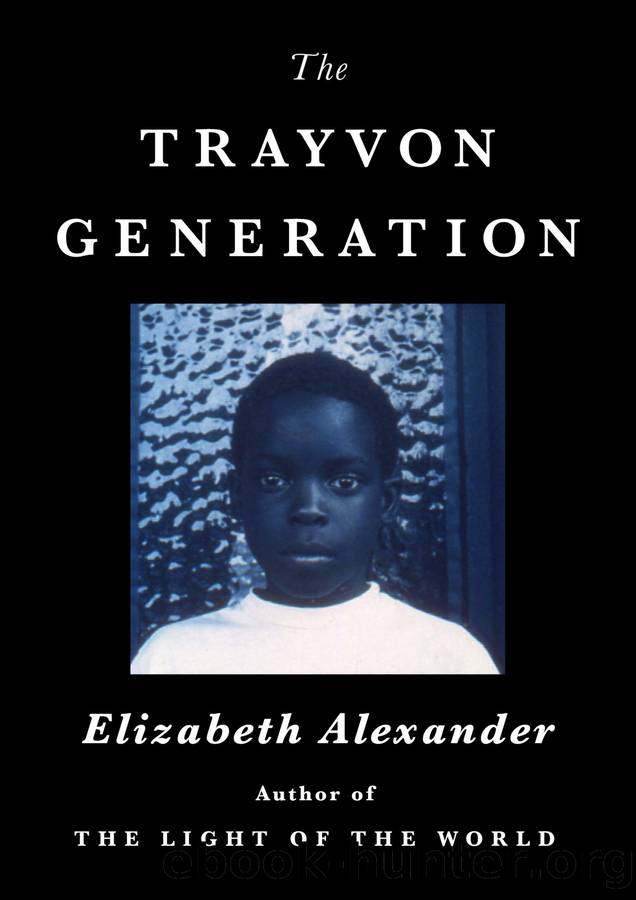The Trayvon Generation by Elizabeth Alexander

Author:Elizabeth Alexander [Alexander, Elizabeth]
Language: eng
Format: epub
Publisher: Grand Central Publishing
Published: 2022-02-22T00:00:00+00:00
Charles White
Banner for Willie J., 1976
What does it mean to be able to bring together the naturalistic and the visionary, to imagine community as capable of reanimating even its most hopeless and anesthetized members? What does it mean for a presumably murdered Black body to come to life in his community in a dance idiom that is uniquely part of Black culture and youth culture, all of that power channeled into a lifting?
A sibling to Josephâs work is Hiro Muraiâs video for Flying Lotusâs âNever Catch Me.â It opens at a funeral for two children, a Black boy and girl, who lie heartbreak-beautiful in their open caskets. Their community grieves inconsolably in the church. The scene is one of profound mourning.
And then the children open their eyes and climb out of their caskets. They dance explosively in front of the pulpit before running down the aisle and out of the church. The mourners cannot see this resurrection, for it is a fantasia. The kids dance another dance of Black LA, the force of Black bodily creativity, that expressive life source born of violence and violation that have upturned the world for generations. The resurrected babies dance with a pumping force. But the communityâs grief is unmitigated, because, once again, this is a dreamscape. The children spring out into the light and climb into a carâno, it is a hearseâand, smiling with the joy of mischievous escapees, drive away. Kids are not allowed to drive; kids are not allowed to die.
What does it mean for a Black boy to fly, to dream of flying and transcending? To imagine his vincible body all-powerful, a body that in this society is so often consumed as a moneymaker and an object of perverse desire, perceived to have superhuman and thus threatening powers? In the video for Kendrick Lamarâs âAlright,â directed by Colin Tilley, Lamar flies through the California city streets, above sidewalks and empty lots, alongside wire fences.
âAlrightâ has been the anthem of many protests against racism and police violence and unjust treatment. Lamar embodies the energy and the message of the resonant phrase Black Lives Matter, which Patrisse Cullors, Alicia Garza, and Opal Tometi catapulted into circulation when, in 2013, they founded the movement. The phrase was apt then and now. Its coinage feels both ancestral in its knowledge and prophetic in its ongoing necessity. I know now with certainty that there will never be a moment when we will not need to say it, not in my lifetime, and not in the lifetime of the Trayvon Generation.
The young Black man flying in Lamarâs video is joyful and defiant, rising above the streets that might claim him, his body liberated and autonomous. At the end of the video, a police officer raises a finger to the young man in the sky and mimes pulling a trigger. The wounded young man falls, slowlyâanother brother downâand lands. The gun was a finger; the flying young man appears safe. He does not get up. But in the final image of this dream he opens his eyes and smiles.
Download
This site does not store any files on its server. We only index and link to content provided by other sites. Please contact the content providers to delete copyright contents if any and email us, we'll remove relevant links or contents immediately.
Cecilia; Or, Memoirs of an Heiress — Volume 1 by Fanny Burney(32558)
The Great Music City by Andrea Baker(32018)
Cecilia; Or, Memoirs of an Heiress — Volume 2 by Fanny Burney(31956)
Cecilia; Or, Memoirs of an Heiress — Volume 3 by Fanny Burney(31940)
We're Going to Need More Wine by Gabrielle Union(19045)
All the Missing Girls by Megan Miranda(16023)
Pimp by Iceberg Slim(14506)
For the Love of Europe by Rick Steves(14121)
Bombshells: Glamour Girls of a Lifetime by Sullivan Steve(14073)
Talking to Strangers by Malcolm Gladwell(13370)
Norse Mythology by Gaiman Neil(13363)
Fifty Shades Freed by E L James(13239)
Mindhunter: Inside the FBI's Elite Serial Crime Unit by John E. Douglas & Mark Olshaker(9339)
Crazy Rich Asians by Kevin Kwan(9290)
The Lost Art of Listening by Michael P. Nichols(7506)
Enlightenment Now: The Case for Reason, Science, Humanism, and Progress by Steven Pinker(7311)
The Four Agreements by Don Miguel Ruiz(6763)
Bad Blood by John Carreyrou(6621)
Weapons of Math Destruction by Cathy O'Neil(6279)
